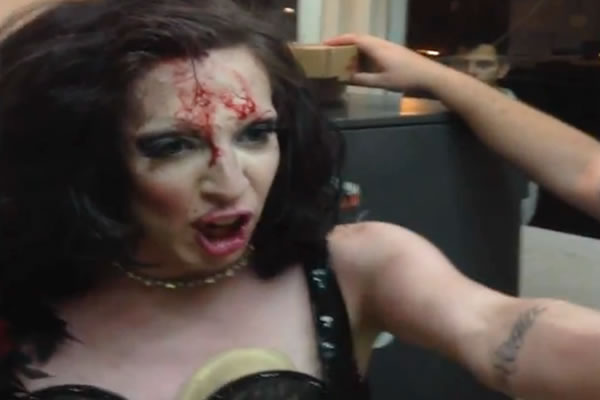Local
Case of assault on drag performer expected to be dropped
No hate crime designation; ‘ridiculously lenient’ outcome


Miles Denaro (Screen capture)
A D.C. Superior Court judge on Friday approved a plea bargain agreement expected to result in the dismissal of a charge of simple assault against the second of two women accused of dragging a gay male drag performer by the hair at a D.C. carry-out pizzeria in June that was captured on video.
Under the agreement offered by the U.S. Attorney’s office, Raymone Harding, 28, of Gaithersburg, Md., pleaded guilty to the assault charge in exchange for being allowed to withdraw the plea and have the charge dismissed if she successfully completes 48 hours of community service over a period of six months.
The agreement also requires her to stay out of trouble, stay away from the man she was charged with assaulting — Miles Denaro, 24 — and undergo a drug test as directed by the court’s Pre-Trial Services Agency.
Judge Juliet J. McKenna approved the agreement for Harding one week after she approved an identical plea agreement for co-defendant Rachel M. Sahle, 22, also from Gaithersburg.
“This is essentially less than a slap on the wrist,” Denaro told the Blade when informed of the outcome of Friday’s court proceeding.
He said one of the prosecutors, Assistant U.S. Attorney David Missler, called him a little over a week ago to inform him of plans for the plea bargain offer and to get his thoughts on the matter. Denaro said Missler told him the two women would be required to perform community service work rather than jail time.
“He said allegedly the judge they are seeing is lenient so he was leaning toward doing this so that way they get community service no matter what,” said Denaro.

A video of the altercation involving drag performer Miles Denaro at Manny & Olga’s pizzeria on 14th Street, N.W., shows these two women assaulting Denaro as one of them drags him by his hair across the floor. (Screen captures)
In a development that had not been previously disclosed, Denaro told the Blade on Friday that he was called to testify before a grand jury convened by prosecutors in July in connection with the assault charges pending against Harding and Sahle.
According to court records, the grand jury did not hand down an indictment in the case, an outcome that court observers consider unusual because grand juries usually follow the recommendation of prosecutors by approving an indictment.
The decision by prosecutors to offer the two women the plea agreement is likely to surprise LGBT activists because it came shortly after the U.S. Attorney’s office told the court it was looking into the possibility of upgrading the assault charge with a “bias” or hate crime designation.
“The government is not seeking a bias enhancement based on the results of a thorough investigation and review of the case,” William Miller, a spokesperson for the U.S. Attorney’s office, told the Blade.
Miller said he could not comment on whether a grand jury is convened on a specific case but said that in general grand juries are sometimes called to assist in an investigation rather than for the purpose of an indictment.
“It is used to get people to testify under oath as an investigative tool,” he said.
D.C. attorney Dale Edwin Sanders, who practices criminal law in D.C. and Virginia, said the fact that the assault against Denaro was captured on video provided prosecutors with a strong case with a good chance of obtaining a conviction against the two women had the case gone to trial.
He said Denaro’s statements that the two women made anti-transgender and anti-gay remarks toward him during and immediately after the attack made a strong case for designating the incident as a hate crime.
“I think this is ridiculously lenient for what happened,” said Sanders in referring to the plea agreement. “To me this sounds like a total whitewash.”
The June 23 incident at Manny & Olga’s pizzeria at 1841 14th St., N.W., created an uproar in the LGBT community after a customer used his cell phone to record the altercation on video and posted the video on a popular hip-hop music website, resulting in it being viewed by thousands in D.C. and across the country.
According to police and court records, the video taken by the customer and a separate video taken by security cameras at the restaurant show Denaro being punched, kicked and dragged across the floor by the hair after being knocked down by the two women. The video posted online also shows that many of the bystanders screamed and laughed as the altercation unfolded. Denaro said no one, including employees at the restaurant, intervened to stop the assault.
He said one or both of the women shouted that he was a man and a “tranny” as they hit him. According to his account of what happened, one of the women called him a “faggot” after the altercation ended when they saw him walk past them on the sidewalk outside.
Miller of the U.S. Attorney’s Office said the plea agreements offered to the two women are part of a widely used court “diversion/deferred sentencing” program that’s limited to misdemeanor cases involving defendants with no prior criminal record.
“Where a defendant is charged with an offense that is potentially diversion eligible, we look at the facts and circumstances surrounding the event and make a determination as to whether diversion is appropriate,” he said.
“A supervisor has to approve a simple assault case for diversion, adding another layer of scrutiny,” he added.
Hassan Naveed, co-chair of the D.C.-based Gays and Lesbians Opposing Violence (GLOV), said the group is assessing the plea bargain agreement offered in the Denaro assault case and would issue a statement on the development shortly.
D.C. transgender activist Jeri Hughes said she was troubled over the outcome of the case, which she said appears to her as a hate crime.
“You’ve got people like trans women in jail because they are poor and turn to prostitution,” Hughes said. “And here are two people who commit a violent attack and they are going to walk. This is unacceptable.”
Virginia
Arlington LGBTQ bar Freddie’s celebrates 25th anniversary
Owner asks public to support D.C.-area gay bars

An overflowing crowd turned out Sunday night, March 1, for the 25th anniversary celebration of Freddie’s Beach Bar, the LGBTQ bar and restaurant located in the Crystal City section of Arlington, Va.
The celebration began as longtime patrons sitting at tables and at the bar ordered drinks, snacks, and full meals as several of Freddie’s well-known drag queens performed on a decorated stage.
Roland Watkins, an official with Equality NoVa, an LGBTQ advocacy organization based in the Northern Virginia areas of Arlington, Alexandria, and Fairfax County, next told the gathering about the history of Freddie’s Beach Bar and the role he said that owner Freddie Lutz has played in broadening the bar’s role into a community gathering place.
“Twenty-five years ago, opening a gay bar in Arlington was not a given,” Watkins told the crowd from the stage. “It took courage, convincing, and a deep belief that our community belongs openly, visibly, and proudly,” he said. “And that belief came from Freddie.”
Watkins and others familiar with Freddie’s noted that under Lutz’s leadership and support from his staff, Freddie’s provided support and a gathering place for LGBTQ organizations and a place where Virginia elected officials, and candidates running for public office, came to express their support for the LGBTQ community.
“Over the past 25 years, Freddie’s has become more than a bar,” Watkins said. “It has become a community maker.”
Lutz, who spoke next, said he was moved by the outpouring of support from long-time customers. “Thank you all so much for coming tonight and thank you all so much for your support over the past 25 years,” he said. “I can’t tell you how much that means to me and how much it’s kept me going.”
But Lutz then said Freddie’s, like many other D.C. area gay bars, continues to face economic hard times that he said began during the COVID pandemic. He noted that fewer customers are coming to Freddie’s in recent years, with a significant drop in patronage for his once lucrative weekend buffet brunches.
“So, I don’t want to be the daddy downer on my 25-year anniversary,” he said. “But this was actually the worst year we’ve ever had,” he added. “And I guess what I’m asking is please help us out. Not just me, but all the gay bars in the area.” He added, “I’m reaching out and I’m appealing to you not to forget the gay bars.”
Lutz received loud, prolonged applause, with many customers hugging him as he walked off the stage.

In an official statement released at the reveal event Capital Pride Alliance described its just announced 2026 Pride theme of “Exist, Resist, Have the Audacity” as a “bold declaration affirming the presence, resilience, and courage of LGBTQ+ people around the world.”
The statement adds, “Grounded in the undeniable truth that our existence is not up for debate, this year’s theme calls on the community to live loudly and proudly, stand firm against injustice and erasure, and embody the collective strength that has always defined the LGBTQ+ community.”
In a reference to the impact of the hostile political climate, the statement says, “In a time when LGBTQ+ rights and history continue to face challenges, especially in our Nation’s Capital, where policy and public discourse shape the future of our country, together, we must ensure that our voices are visible, heard, and unapologetically centered.”
The statement also quotes Capital Pride Alliance CEO and President Ryan Bos’s message at the Reveal event: “This year’s theme is both a declaration and a demand,” Bos said. “Exist, Resist, Have Audacity! reflects the resilience of our community and our responsibility to protect the progress we’ve made. As we look toward our nation’s 250th anniversary, we affirm that LGBTQ+ people have always been and always will be part of the United States’s history, and we will continue shaping its future with strength and resolve,” he concluded.
District of Columbia
Capital Pride board member resigns, alleges failure to address ‘sexual misconduct’
In startling letter, Taylor Chandler says board’s inaction protected ‘sexual predator’

Taylor Lianne Chandler, a member of the Capital Pride Alliance Board of Directors since 2019 who most recently served as the board’s secretary, submitted a letter of resignation on Feb. 24 that alleges the board has failed to address instances of “sexual misconduct” within the Capital Pride organization.
The Washington Blade received a copy of Chandler’s resignation letter one day after she submitted it from an anonymous source. Chandler, who identifies as transgender and intersex, said in an interview that she did not send the letter to the Blade, but she suspected someone associated with Capital Pride, which organizes D.C.’s annual LGBTQ Pride events, “wants it out in the open.”
“It is with a heavy heart, but with absolute clarity, that I submit my resignation from the Capital Pride Alliance Board of Directors effective immediately,” Chandler states in her letter. “I have devoted nearly ten years of my life to this organization,” she wrote, pointing to her initial involvement as a volunteer and later as a producer of events as chair of the organization’s Transgender, Gender Non-Conforming, and Intersex Committee.
“Capital Pride once meant something profound to me – a space of safety, visibility, and community for people who have often been denied all three,” her letter continues. “That is no longer the organization I am part of today.”
“I, along with other board members, brought forward credible concerns regarding sexual misconduct – a pattern of behavior spanning years – to the attention of this board,” Chandler states in the letter. “What followed was not accountability. What followed was retaliation. Rather than addressing the substance of what was reported, officers and fellow board members chose to chastise those of us who came forward.”
The letter adds, “This board has made its priorities clear through its actions: protecting a sexual predator matters more than protecting the people who had the courage to come forward. … I have been targeted, bullied, and made to feel like an outsider for doing what any person of integrity would do – telling the truth.”
In response to a request from the Blade for comment, Anna Jinkerson, who serves as chair of the Capital Pride board, sent the Blade a statement praising Taylor Chandler’s efforts as a Capital Pride volunteer and board member but did not specifically address the issue of alleged sexual misconduct.
“We’re also aware that her resignation letter has been shared with the media and has listed concerns,” Jinkerson said in her statement. “When concerns are brought to CPA, we act quickly and appropriately to address them,” she said.
“As we continue to grow our organization, we’re proactively strengthening the policies and procedures that shape our systems, our infrastructure, and the support we provide to our team and partners,” Jinkerson said in her statement. “We’re doing this because the community’s experience with CPA must always be safe, affirming, empowering, and inclusive,” she added.
In an interview with the Blade, Chandler said she was not the target of the alleged sexual harassment.
She said a Capital Pride investigation identified one individual implicated in a “pattern” of sexual harassment related behavior over a period of time. But she said she was bound by a Non-Disclosure Agreement (NDA) that applies to all board members and she cannot disclose the name of the person implicated in alleged sexual misconduct or those who came forward to complain about it.
“It was one individual, but there was a pattern and a history,” Chandler said, noting that was the extent of what she can disclose.
“And I’ll say this,” she added. “In my opinion, with gay culture sometimes the touchy feely-ness that goes on seems to be like just part of the culture, not necessarily the same as a sexual assault or whatever. But at the same time, if someone does not want those advances and they’re saying no and trying to push you away and trying to avoid you, then it makes it that way regardless of the culture.”
When asked about when the allegations of sexual harassment first surfaced, Chandler said, “In the past year is when the allegation came forward from one individual. But in the course of this all happening, other individuals came forward and talked about instances – several which showed a pattern.”
Chandler’s resignation comes about five months after Capital Pride Alliance announced in a statement released in October 2025 that its then board president, Ashley Smith, resigned from his position on Oct. 18 after Capital Pride became aware of a “claim” regarding Smith. The statement said the group retained an independent firm to investigate the matter, but it released no further details since that time. Smith has declined to comment on the matter.
When asked by the Blade if the Smith resignation could be linked in some way to allegations of sexual misconduct, Chandler said, “I can’t make a comment one way or the other on that.”
Chandler’s resignation and allegations come after Capital Pride Alliance has been credited with playing the lead role in organizing the World Pride celebration hosted by D.C. in which dozens of LGBTQ-related Pride events were held from May through June of 2025.
The letter of resignation also came just days before Capital Pride Alliance’s annual “Reveal” event scheduled for Feb. 26 at the Hamilton Hotel in which the theme for D.C.’s June 2026 LGBTQ Pride events was to be announced along with other Pride plans.



















